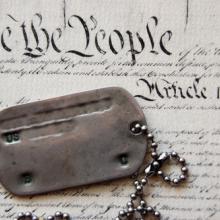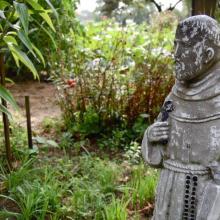Service
MARRIAGE IS A wonderful thing. Yet it seems to be taking a hit in our society, and I must say it is taking a hit in my community at rates I am very uncomfortable with as an African American.
My wife, Donna, and I have been working in ministry and missions for a long time, and we see our marriage as a key to our work. We live and work in the city in a mostly black neighborhood, and the percentage of married black couples is extremely low. Modeling a great marriage is something we take seriously and make very public. If we didn’t make our marriage and relationship public, some of the young people we know and work with would not know personally any happily married African-American couples.
It is our intent to live out our lives as a couple and family so others can see its beauty and challenge. Our community has upwards of 90 percent single-parent homes, with few dads present and even fewer marriages. Marriage is one of our greatest “testimonies” of God’s grace and love in our lives. How we love each other and our children is a important part of our work, so we are very intentional about the health of our marriage. This has given us the opportunity to love each other well.
A public manifestation of our marriage means we celebrate one another with friends as much as possible. We announce our date nights and trips we take together, and we publicize special days and anniversaries. We let people know how much we enjoy it being just the two of us, and we even disagree publicly so people know we are individuals and have our own opinions. It is our opinion that black children need to see and interact with healthy black couples.
Back in 2005, I attended a “church growth” seminar in Dallas, Texas. The keynote speaker was Rev. Mike Slaughter of Ginghamsburg United Methodist in Ohio, one of the larger and faster growing UM churches in the country. He shared an experience that sticks with me.
That church had a “Cookie Patrol” that takes cookies to first time visitors. So, every Sunday afternoon, a group of people would meet down at the church to bake fresh cookies to be delivered to potential members.
One day, a member of the church came to Rev. Slaughter and told him, “I just love to bake, and I want to help with the Cookie Patrol. I’ve got a great kitchen at home, so let me tell you what I’ll do. I’ll make several dozen cookies each Sunday and bring them to the church. I just don’t have time to spend at church on Sunday afternoons.”
Pastor Mike responded, “You don’t understand. We don’t need your cookies. We need you.”
IN EARLY AUGUST 2010, 10 aid workers were murdered, execution-style, in the province of Badakhshan, in northeastern Afghanistan. Among them were six Americans, two Afghans, a Briton, and a German, all part of a medical mission. It was the deadliest attack on aid workers the country had seen.
Dan Terry, 63, an American humanitarian who, with his family, had called Afghanistan home for more than 30 years, was among the dead.
What compels a person to risk his or her life in a foreign land so riddled with conflict? For Terry it was simple—he was called to a life of peacemaking and service.
A friend of Terry's since childhood, writer Jonathan Larson draws us into Terry's passionate character and the vision he shared with friends in Afghanistan: reconciliation and dialogue. "In the end, we're all knotted into the same carpet," Terry was fond of saying. From a swath of interviews with family, friends, and colleagues, both Western and Afghan, Larson has assembled "oral narratives," sharing with us the exhilarating life of a generous and gentle man, heroic but humble.
The best advice I received as a humanitarian aid worker in Afghanistan was from a leader cut from the same cloth as Terry: "Make no assumptions" and "listen first." We too often accept media caricatures of the other, labels that shut down discourse and clamp off possibility and hope. Challenging this, Terry insisted on the unwavering potential of each person he met. "Categorical 'enemies' have rescued me ... again and again," he once wrote to friends.
This pledge, which draws on one used by Mahatma Gandhi's independence campaign in India, was used in the U.S. civil rights movement in the 1950s and '60s.
When I go out with my Dad, he often wears a cap identifying him as a Korean War veteran. Over and over again, people tell him, “Thank you for serving.” Over and over again.
I’m always struck by the contrast between that appreciation and the sad, hidden truth about our country’s treatment of some other veterans. I’m speaking of the government’s detention and deportation of many immigrants who served in our armed forces but who are not yet citizens.
The first time I heard about this was 1998. My friend’s husband, a Canadian who grew up in Texas and chose to serve in Vietnam had recently gotten a deportation order based on some old drug charges, the kind of thing many vets experienced. What horrified me then, and still does today, is that immigration judges could not grant an exception. Nothing could stop the deportation except a change in U.S. immigration laws.
Washing dishes. This is how I remember Momadu.
Washing dishes is a chore, you know. In the pre-dishwasher days in America, my mom put "wash the dishes" on my list of things to do every day. I washed them, obediently though begrudgingly.
In the pre-dishwasher days in Mali, though, we asked Momadu to wash the dishes, and he washed them with joy.
How could he do something as mundane as washing dishes and do it with joy?
As baby boomers start clicking the senior citizen box on travel fares, I want to say a word to my generation and to the one that preceded us.
It is time for us to get out of the way.
I don't mean easing into wheelchairs. For the most part, we're way too healthy and energetic for that. I mean the harder work of relinquishing control.
I see that need most clearly in religious institutions, where I work. But I see it elsewhere, too, from taxpayer "revolts" led by seniors against today's schoolchildren to culture wars that we won't let die.
Growing up I shadowed my father to a great deal of community and board meetings, public hearings, and church events. By the time I was 2 years old, my father had already been elected to represent a working-class district of East Baltimore City. The example of public service and the principles of stewardship and goodwill that my father carries became some of the most important things that contributed to the way I view our world and the way I treat our people.
Growing up in Kuwait, Asif Balbale thought he wanted to become a chemical engineer. He never imagined enlisting in the U.S. Navy, much less becoming an imam.
Balbale got his engineering degree after immigrating to the U.S. at age 21. With jobs hard to come by, he tried to enlist in the Army, but didn't weigh enough. Instead, he met the Navy's minimum requirements.
He was sworn in as a U.S. citizen in 2005 while deployed aboard the USS Boxer. Intending to apply for an officer program, Balbale, 31, mistakenly emailed a recruiter for the chaplain corps.
"God, I think, had better plans for me," Balbale said, looking back.
And so it is for a number of military chaplains who, by twists of fate or perhaps divine Providence, found their calling to become chaplains while on active duty.
Despite all that I knew 40 years ago about the policy and politics of the Vietnam war, I learned much more by simply listening to veterans. Late at night, often in bars, I heard about the war from the experience of those who fought it. And that taught me more than everything I had ever read. With tens of thousands of vets coming home from Iraq in the next two months -- and many more returning from Afghanistan over the next two years -- we'll have plenty of opportunities to say thanks, and then just listen.
Today (Oct. 4) Christians around the world celebrate the life of St. Francis of Assisi, one of the bright lights of the church and one of the most venerated religious figures in history.
The life and witness of Francis is as relevant to the world we live in today as it was 900 years ago. He was one of the first critics of capitalism, one of the earliest Christian environmentalists, a sassy reformer of the church, and one of the classic conscientious objectors to war.
Earlier this summer I attended a church service where the pastor, a man struggling with what appears to be his final bout with cancer, preached about the hope that Jesus promises to those who trust in him. After describing the returning Jesus brandishing a sword and dripping with the blood of all our vanquished enemies, he invited the audience to share what they saw as the hope that this Jesus promises. The responses ranged from no cancer, to no pain, to no worries about paying the bills, to the promise of an upgraded body -- all of course in heaven someday after we die. The congregation was encouraged to find contentment in the present from the possibility of realizing these promises someday. Our souls are what matter; the body just has to endure until our souls reach heaven. No mention of help with how to pay this month's rent or what it means for a cancer-ridden body to be the temple of the Holy Spirit, just the spiritual promise that someday all will be well.
The Lord called Samuel again, a third time. And he got up and went to Eli, and said, 'Here I am, for you called me.' Then Eli perceived that the Lord was calling the boy. 9Therefore Eli said to Samuel, 'Go, lie down; and if he calls you, you shall say, "Speak, Lord, for your servant is listening." (1 Samuel 3.8-9)
I am in a profession where the term "call" is used frequently. When used as a verb, "call" is about feeling that tug between you and God toward something that at first may not seem practical, desirable, or even expected. When used as a noun, "call" can be synonymous to a job, occupation, ministry, or church -- hence the term "seeking a call."
For me, "seeking a call" simply means trying to figure out what to do next. And lately this task has felt like an impossible mission. I have always admired -- or if I'm to be honest, jealous of -- those that seem to have a clear sense of their calling. Take my husband for example, he feels very called to be a pastor. Although there are times when he struggles with the type of church or ministry he feels called to serve, he has certainty that his call is that of a pastor. I wish that was the case for me. I have always felt called to a place, such as seminary or my current congregation, but I have never felt confirmation or an affinity to my call as a pastor. This may not make sense or may seem odd, but welcome to my life.
I have always loved the story of Samuel being called.
Many people remember "O God, Our Words Cannot Express," a hymn written on the afternoon of September 11, 2001. The hymn was quickly shared by email and Web postings (it is still on over 10,000 websites); it was used by many churches on that evening and in the days that followed. The hymn was featured in newspaper stories, radio programs, twice on national PBS-TV, and on BBC-TV in the United Kingdom. YouTube has the Church World Service music video by Emmy winner Pete Staman of this hymn being sung by Noel Paul Stookey (of "Peter, Paul & Mary") with the Northfield Mount Herman School Choir.
The new posting of this interfaith hymn includes a revised version for the 10th anniversary. Also included is "God, We've Known Such Grief and Anger", a hymn lifting up Christian hope in the face of disaster that was written for the first year anniversary of 9/11. Last week I wrote a new hymn for the tenth anniversary of September 11 with an emphasis on working for peace and justice for all.
!['Civil Rights March on Washington, D.C. [Dr. Martin Luther King, Jr., President of the Southern Christian Leadership Conference, and Mathew Ahmann, Executive Director of the National Catholic Conference for Interrracial Justice, in a crowd.], 08/28/1963' photo (c) 1963, The U.S. National Archives - license: http://www.flickr.com/commons/usage/](http://lh3.ggpht.com/-XUAmAA_vWKI/Ti7l4ZavSOI/AAAAAAAACS8/0Y0EfQ03QzA/Flickr-4101511358.jpg) How should music rank among the ever-growing list of time-tested nonviolent methods such as boycotts, marches, strikes, sit-ins, and vigils?
How should music rank among the ever-growing list of time-tested nonviolent methods such as boycotts, marches, strikes, sit-ins, and vigils?
Anthony Shadid of the New York Times reports that a song, "Come on Bashar, Leave," is spreading across Syria, boldly calling on President Bashar al-Assad to step down. (Bryan Farrell also wrote about it at the Waging Nonviolence blog.) The article suggests that a young cement layer who chanted it in demonstrations was pulled from the Orontes River this month, his throat having been cut, and, according to residents of the city of Hama, his vocal chords torn out. Hama is where, in 1982, then-president Hafez al-Assad, father of the current president named in the song, gave orders to the army to massacre more than 10,000 in putting down an Islamist upheaval. Today, boys 6-years-old and older vocalize their own rendition of the original warbler's song instead. As the song has sped across Syria, demonstrators have adopted it for themselves.









